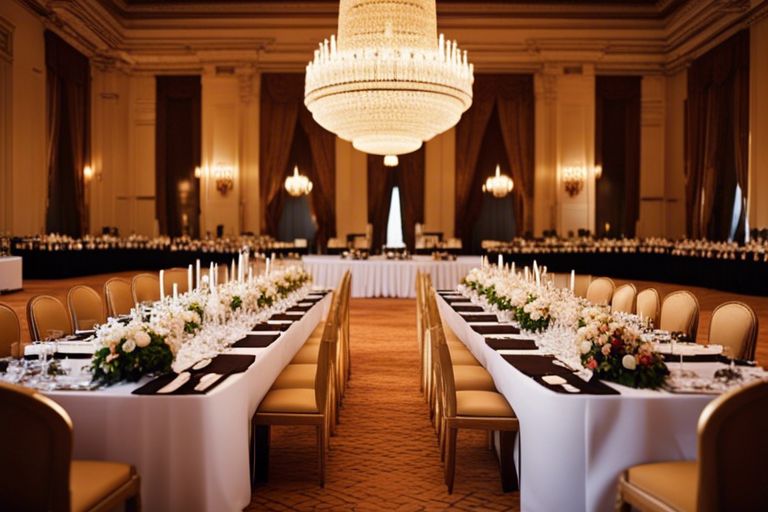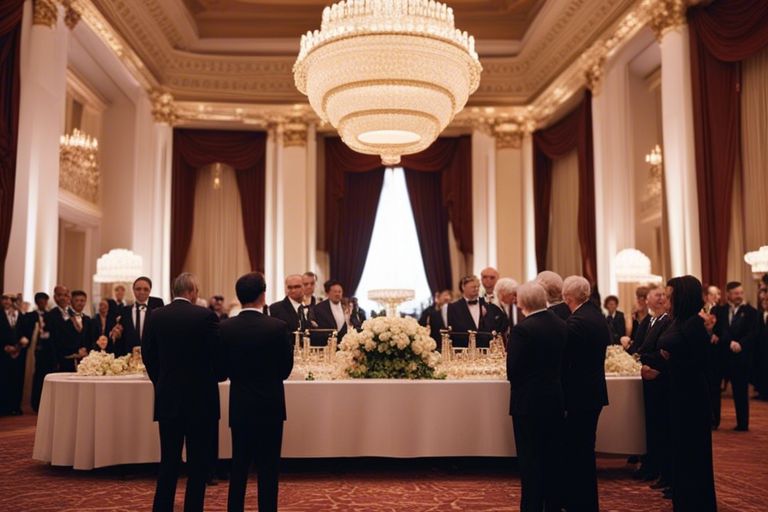It’s important to navigate the intricate world of diplomacy with grace and poise. Understanding diplomatic etiquette and protocol is crucial for maintaining relationships, fostering agreements, and representing one’s country with dignity. From proper greetings to seating arrangements, every detail holds significance in international relations. Let’s probe into the intricate nuances of diplomatic etiquette to ensure smooth and respectful interactions on the global stage.
Key Takeaways:
- Diplomatic etiquette is crucial: It helps build respectful and constructive relationships between nations.
- Proper protocol must be followed: Understanding and adhering to protocol ensures smooth diplomatic interactions and avoids misunderstandings.
- Respect cultural differences: Being aware of and respecting different cultural norms is vital for successful diplomatic relations.
- Master communication skills: Diplomats should possess exceptional communication skills to convey messages effectively and avoid conflicts.
- Attention to detail is key: Paying attention to small details such as titles, forms of address, and gestures can make a significant impact in diplomatic interactions.
- Adaptability is important: Being adaptable and flexible in various diplomatic situations shows professionalism and can help in achieving successful outcomes.
- Confidentiality is paramount: Diplomats must maintain confidentiality and discretion to uphold trust and credibility in their diplomatic relations.
Fundamentals of Diplomatic Etiquette
Respect for Cultural Differences
While engaging in diplomatic interactions, it is crucial to show respect for cultural differences. Understanding and respecting the norms, customs, and traditions of other cultures can go a long way in building trust and fostering positive relationships.
Awareness of Nonverbal Cues
To ensure effective communication in diplomatic settings, it is necessary to be aware of nonverbal cues. Body language, gestures, and facial expressions can convey messages that may differ from verbal communication. Paying attention to these cues can help avoid misunderstandings and enhance mutual understanding.
Awareness of nonverbal cues includes being mindful of posture, eye contact, and personal space. Different cultures may interpret these nonverbal cues differently, so it is necessary to adapt your behavior accordingly to show respect and build rapport with people from diverse backgrounds.
Official Visits and Meetings
There’s a certain level of decorum and protocol to be observed during official visits and meetings in diplomatic circles. Understanding the nuances of these interactions is crucial for fostering positive relationships between nations. For a comprehensive guide on diplomatic protocol, check out Protocol: The Power of Diplomacy and How to Make It Work.
Preparing for a State Visit
To ensure a seamless state visit, meticulous planning is crucial. This includes coordinating schedules, arranging accommodation, and preparing for cultural differences to show respect and understanding.
Protocol for Meeting Heads of State
Visits with heads of state require adherence to strict protocol. Greetings, seating arrangements, and conversation topics are all carefully considered to maintain diplomatic relations and show proper respect.
Official visits and meetings play a crucial role in international diplomacy, setting the tone for future collaborations and negotiations. Ensuring that all protocols are observed helps to avoid misunderstandings and demonstrates respect for diplomatic customs and traditions.
Diplomatic Gift-Giving Etiquette
Preparing thoughtful and culturally appropriate gifts is an crucial aspect of diplomatic etiquette. Gifts should reflect the significance of the occasion and show appreciation for the host country’s culture and customs.
This chapter investigates into the intricacies of diplomatic gift-giving, offering insights into selecting the perfect gift, navigating cultural sensitivities, and ensuring that the gesture is well-received and reciprocated accordingly.

Communication and Correspondence
To Benefits of Applying Proper Etiquette and Protocol in Diplomatic Communication, communication and correspondence play a vital role in diplomatic etiquette. Ensuring clear and respectful communication is imperative in maintaining positive relationships and avoiding misunderstandings.
Formal Letter Writing and Email Etiquette
Formal letter writing and email etiquette are crucial aspects of diplomatic communication. It is important to follow proper formatting, address recipients correctly, and use polite language in all written correspondences to convey professionalism and respect.
Telephone and Video Conference Protocol
Telephone and video conference protocol is imperative in diplomatic settings. When engaging in these communication methods, it is important to be punctual, have a clear agenda, and maintain professionalism throughout the conversation. Proper etiquette in these situations can help to facilitate productive discussions and build stronger relationships.
Interpreters and Translation Etiquette
Letter Interpreters and translation etiquette is crucial in diplomatic communication to ensure accurate and respectful exchanges. When working with interpreters or translated documents, it is important to provide all necessary information, communicate clearly, and be patient to enable effective communication between parties speaking different languages.
Communication and correspondence are the cornerstones of diplomatic etiquette and protocol. By following proper etiquette in all forms of communication, diplomats can build stronger relationships, avoid misunderstandings, and ensure successful interactions on the international stage.
Table Manners and Dining Etiquette
Your dining etiquette says a lot about you in diplomatic settings. From formal table settings to international dining customs, it is crucial to navigate these situations with finesse and respect.
Formal Table Settings and Place Settings
Settings at a formal table are elaborate and can vary depending on the occasion. Familiarize yourself with the placement of cutlery, glassware, and plates to ensure you navigate the meal gracefully.
International Dining Customs and Traditions
The customs around dining vary around the world. It’s crucial to research and understand the dining traditions of your host country to show respect and appreciation for their culture.
Dining is a universal language, and understanding the customs and traditions of different countries can help you navigate diplomatic dinners with ease. Pay attention to seating arrangements, use of cutlery, and dining pace to ensure you blend in seamlessly with your hosts and fellow guests.
Wine Etiquette and Toasting Protocol
Any diplomatic event may include wine service and toasting. Understanding wine etiquette, such as how to hold a wine glass and when to toast, is crucial. Be mindful of cultural differences in toasting customs to avoid any unintentional faux pas.
Table manners extend to wine etiquette during formal gatherings. Remember to hold your wine glass by the stem, take small sips, and never refill your own glass. When toasting, maintain eye contact and raise your glass slightly to show respect to the person being honored.
Dress Code and Attire
Formal Wear for Men and Women
For formal diplomatic events, men are expected to wear suits in classic colors such as navy, black, or gray, paired with a tie. Women should opt for elegant cocktail dresses or tailored suits. Avoid revealing attire and choose conservative hemlines and necklines.
Cultural and Religious Dress Code Considerations
Women should be mindful of cultural and religious dress codes when attending diplomatic events. In some cultures, covering the head or wearing certain types of attire holds significant importance. It is imperative to research and respect these customs to show cultural sensitivity and understanding.
Dress codes can vary greatly depending on the country or culture you are visiting, so it’s crucial to do thorough research before attending a diplomatic event. When in doubt, opt for conservative and traditional attire to show respect for the host country’s customs and traditions.
Accessorizing with Diplomatic Flair
Cultural accessories such as scarves, brooches, or traditional jewelry can add a touch of diplomatic flair to your outfit. However, be careful not to overdo it – choose one or two subtle pieces that complement your attire without overpowering it.
Wearing cultural accessories thoughtfully can serve as a conversation starter and showcase your interest in and respect for the host country’s culture. Keep in mind, diplomacy is not just about what you say, but also about how you present yourself, including your choice of accessories.

International Events and Ceremonies
Protocol for State Funerals and Memorial Services
Memorial Not only are state funerals and memorial services somber occasions, but they also carry significant diplomatic importance. Proper decorum and respect must be observed, such as maintaining silence during services and adhering to dress codes.
Inaugurations and Official Openings
Inaugurations Inaugurations and official openings are pivotal occasions that mark the start of a new chapter. Diplomats must be punctual, adhere to seating arrangements, and be mindful of cultural sensitivities during ceremonies.
A State inaugurations often involve intricate ceremonies and symbolic gestures that hold deep cultural significance. It is necessary for diplomats to familiarize themselves with the customs and rituals of the host country to navigate these events with grace and respect.
Receptions and Cocktail Parties
Any Receptions and cocktail parties offer a more relaxed setting for diplomatic interactions. Despite the casual atmosphere, diplomats must still maintain a professional demeanor, engage in polite conversation, and adhere to social protocols.
Ceremonies Whether solemn or celebratory, ceremonies play a vital role in diplomatic engagements. Diplomats must conduct themselves with grace, poise, and cultural sensitivity to uphold the dignity of the event and strengthen international relations. It is necessary to follow the established protocols and show respect for the host country’s traditions and customs.
Final Words
Conclusively, understanding diplomatic etiquette and protocol is paramount in maintaining respectful and successful interactions between nations. Just as in personal interactions, following established guidelines and demonstrating cultural sensitivity can go a long way in fostering positive relationships and fruitful diplomatic negotiations.
FAQ
Q: What is the importance of diplomatic etiquette and protocol?
A: Diplomatic etiquette and protocol provide guidelines for interactions between diplomats and government officials to ensure smooth communication, respect, and professionalism in international relations.
Q: What is the difference between etiquette and protocol in diplomacy?
A: Etiquette refers to the expected norms of behavior, while protocol involves the formal rules and procedures governing diplomatic interactions, such as the order of precedence and proper forms of address.
Q: Why is it crucial to follow diplomatic protocol?
A: Adhering to diplomatic protocol demonstrates respect for the host country, upholds diplomatic norms, and helps avoid misunderstandings or unintended offenses in international relations.
Q: What are some key elements of diplomatic etiquette?
A: Key elements of diplomatic etiquette include showing respect, maintaining confidentiality, being punctual, dressing appropriately, and using diplomatic language and formalities in communication.
Q: How should diplomatic gifts be handled?
A: Diplomatic gifts should reflect the culture and traditions of the giver, be of appropriate value and symbolism, and follow any regulations or restrictions of the host country to avoid any appearance of impropriety.
Q: What is the role of a protocol officer in diplomatic missions?
A: A protocol officer is responsible for planning and executing diplomatic events, managing official visits, coordinating ceremonies, arranging seating plans, and ensuring that diplomatic protocol is followed to maintain the dignity and prestige of the mission.
Q: How can one learn more about diplomatic etiquette and protocol?
A: One can learn more about diplomatic etiquette and protocol through training programs, workshops, books, and online resources offered by diplomatic academies, foreign ministries, and experienced diplomats who specialize in international protocol and etiquette.